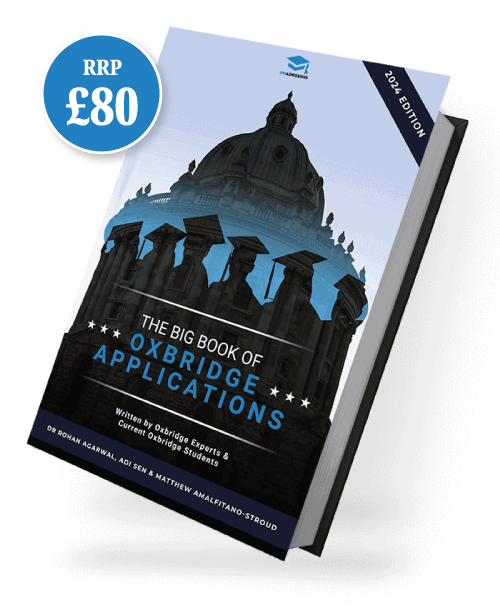If you’re planning to attend one of the best medical schools in the world, the University of Oxford and the University of Cambridge should both be on your radar. Each university offers a highly rated medicine degree, as well as a legacy and student experience unlike any other university in the world.
They’re both fantastic options to begin your career in medicine, but which one should you pick? In this guide, we’ll be looking at both medical schools to see how they compare to one another and determine if one is better than the other.
Why Oxbridge Medicine?
Before we look at the two universities separately, let’s explore why you’d consider Oxbridge Medicine in general:
Teaching Style
Both Oxford and Cambridge place a heavy emphasis on the sciences during the first two years, meaning anyone who’s interested in that aspect of the subject will be suited to Oxbridge.
Colleges
The collegiate systems at Oxford and Cambridge mean that students can have vastly different university experiences from one another. There are plenty to pick from and are a defining part of your time at Oxbridge.
Legacy
The history of Oxbridge dates back nearly 1,000 years, during which many traditions, buildings and stories were created and remain a part of student life to this day. The Oxbridge experience is truly unique and a big part of why many people apply there.
Rankings
Oxford and Cambridge each rank at the top of most university ranking tables, both general and medicine-specific. In 2024, Oxford and Cambridge are ranked 2nd and 5th on the QS Top Universities’ ranking table for Medicine.
These are all very valid reasons for applying to Oxbridge, though you may also have other reasons more specific to the course content, as well as reasons that may be personal to you.
Why Not Oxford and Cambridge?
You may be wondering why you need to make the choice in your application. In the UK, the University and Colleges Admissions Service (UCAS) allows applicants to select up to five university options (though only four medicine degrees can be selected in a single year), so why not apply to both? However, a specific rule has been put in place to prevent applicants from applying to both Oxbridge universities, so you will have to make the decision.
While you can’t apply to both in the same admissions cycle, there are instances where you could apply to – and even attend – both universities. If you didn’t get admitted, you’ll have the option to re-apply the following year, meaning you could choose the other Oxbridge university if you wanted.
If you’re studying a different degree at Oxford or Cambridge and want to move to medicine after graduation, you could apply for Graduate Medicine at the other university, provided you meet the entry requirements. If you’re admitted, this means you’ll have attended both Oxford and Cambridge.
Now, assuming you’re committed to applying for Oxbridge, let’s go through all of the major factors to consider when deciding between Oxford and Cambridge medicine.

Determined to study Oxbridge Medicine? Triple your chances of success with UniAdmissions
At UniAdmissions, we’ve helped over 500 students get into Oxford and Cambridge, including their medicine degrees. Using our specialised and highly focused resources, structured within our unique curriculum, you’ll have everything you need to become the ideal Oxbridge applicant and succeed in every step of the application process.
Discover our Oxbridge Medicine Full-Blue Programme by clicking the button below to enrol and triple your chances of success.
Oxford vs Cambridge Medicine: Rankings
Rankings aren’t the most important thing to consider when choosing a university, but they’re a good place to start as they can offer one of the most objective measures of which university is best.
Our Medical School Rankings Guide explores the two full tables in depth (The Complete University Guide and The Guardian), but let’s focus on Oxford and Cambridge specifically.
Oxford Medicine Ranking 2025
Complete University Guide
2nd
The Guardian
2nd
Cambridge Medicine Ranking 2025
Complete University Guide
1st
The Guardian
4th
Based on these two rankings, we can see a fairly clear picture: Cambridge Medicine is better than Oxford Medicine. Ranking lower than Cambridge on both lists, Oxford even missed out on the Top five in The Guardian’s rankings.
However, this isn’t the full picture. Firstly, we already saw that Oxford ranked higher than Cambridge in the QS Global Ranking Table for medicine. Plus, it’s important to consider that these results only represent one year of data and that rankings often change from year to year.
Other High-Ranking UK Medical Schools
Oxford and Cambridge aren’t the only medical schools that are highly rated by students and education organisations. There are various other universities that are consistently ranking in the top spots on lists like these:
G5 Medical Schools
Four of the five G5 universities in the UK offer medicine degrees. Oxford and Cambridge are two, but Imperial College London and University College London (UCL) also appear high on ranking tables like these. Complete University Guide ranked UCL and Imperial at 3rd and 4th respectively, while The Guardian ranked them a bit lower – 3rd for Imperial and 11th for UCL.
Scottish Medical Schools
Certain Scottish medical schools tend to rank very well in many of these tables. The University of Edinburgh ranked 5th and 6th on both lists we’ve looked at, while the University of St. Andrews performs consistently well (7th on The Guardian table). As well as this, the University of Aberdeen was the highest-ranked medical school by The Guardian, although Complete University Guide ranked much lower at 19th.
Bristol Medical School
Although not as highly ranked as the others we’ve seen, Bristol tends to be seen in the top 15 medical schools in the UK. In 2023, it came in at 6th by Complete University Guide and 9th by The Guardian.
With all of this in mind, you should never make a decision on your university choice based solely on the rankings as they aren’t as definitive as you may think and can’t factor in a lot of more subjective and personal reasons for applying to a certain university.
They’re a helpful tool to learn which medical schools are generally well regarded, but take these results with a pinch of salt and don’t assume one university will be better for you than another just because of the rankings. If you want to learn more about the differences between Oxbridge and Non-Oxbridge medical schools, we have a guide comparing them so be sure to check it out.

Oxford vs Cambridge Medicine: Acceptance Rates
One major consideration when applying to any university is the acceptance rates – essentially how likely you are to get in. Medicine is generally getting more competitive as the years go on, but Oxford and Cambridge are notoriously difficult to get into for most subjects, medicine included.
Here are the acceptance rates for both university’s medicine degrees in 2023:
Applicants: 1,712
Offers: 162
Acceptances: 149
Offer Rate: 9.5%
Acceptance Rate: 8.7%
Applicants: 1,754
Offers: 288
Acceptances: 273
Offer Rate: 16.4%
Acceptance Rate: 15.6%
As you can see, Oxford is considerably more competitive than Cambridge, with over 100 fewer students accepted. The two degrees have roughly the same amount of applicants each year, so it’s clear that those applying to Oxford will have to work slightly harder to earn their offer (though applicants for both will need to create extremely competitive applications anyway).
Oxbridge Medicine Interview Shortlisting Rates
As we’ll see soon, both universities require applicants to attend an interview, but not everyone who applies is invited. Here are the typical rates of invitation for interviews at Oxford and Cambridge:
Oxford Medicine Interview Rate
23%
(Data stated on course page)
Cambridge Medicine Interview Rate
70%
That’s a huge difference in the number of applicants each university interviews and explains why Cambridge generally admits more students (although consider that the number of places is pre-determined before applications start). What this does mean is that those who get an interview at Oxford are much more likely to be admitted, as you’ve already been chosen over 75% of the cohort.
Access "The Oxbridge Application Vault"
- 300+ page ebook for Oxbridge Applicants
- 25 page ebook for Personal Statement
- 2h+ online course to succeed in any exam
- Online Oxbridge Success Calculator
- 12 page ebook about UniAdmissions

Access "The Big Book Of Oxbridge Applications" For FREE
If you want to earn your place at Oxford or Cambridge, you’ll need to learn more about the Oxbridge Medicine application process. Start your journey with The Big Book Of Oxbridge Applications, available for free here! Through over 350 pages, you will find:
- 28 example Oxbridge Personal Statements
- Over 40 admissions test practice questions
- Interviews with Oxbridge students and graduates
- Additional downloadable resources
Fill in your details below to claim your digital copy today!

Oxford vs Cambridge Medicine: Application Process
The application process for medicine at Oxbridge is one of the factors that actually remains very consistent between the two universities. Medicine applications across the whole of the UK are fairly standardised, with Oxford and Cambridge not being very different from non-Oxbridge medical schools.
Let’s briefly look at all the major steps that you’ll need to take to apply for Oxford or Cambridge medicine:
UCAS Application
As with any university application in the UK, you’ll need to apply via UCAS, which will involve filling out your personal information, education history and university choices, as well as obtaining a reference from a member of faculty at your place of education.
This process doesn’t change when applying for medicine or Oxbridge but be aware that the submission deadline for those applicants is earlier than standard applications. UCAS applications are normally submitted by the end of January at the latest, but those applying for medicine or Oxbridge must submit their application by October 15th in order for it to be considered.
UCAS Personal Statement
The most in-depth part of the UCAS application is the Personal Statement, which is a 4,000-character-long piece of writing that must explain why you deserve a spot in your chosen courses. These tend to focus on your academics, work experience and additional experiences/research that you have undertaken to build yourself up as a worthy applicant.
This will need to be submitted digitally with the rest of your UCAS application by October 15th. Be aware that, according to Oxford faculty, the Personal Statement doesn’t play a major role in their decision-making process for shortlisting, although they do still look at it. We can assume the same is true for Cambridge, although they may place slightly more importance on it.
Personal Statements are changing in 2025, so be prepared for the new format if you’re applying for medicine next year.
College Selection
A unique part of the Oxbridge application process is the selection of the college you wish to apply to. While you will be applying to Oxford/Cambridge, you will technically only be applying to attend one specific college (unless you choose an open application). We’ll discuss colleges a bit later but know that this is an important decision that will have a major impact on your university experience.
It’s important to understand that your application, including the subsequent steps you’ll need to complete, is reviewed/implemented by the college you apply for. You can learn about all of the Oxbridge colleges in our Oxford and Cambridge college guides:
UCAT
The University Clinical Aptitude Test (UCAT) is the standardised admissions test used by all UK medical schools. While the Biomedical Admissions Test (BMAT) was previously used by several universities, including Oxford and Cambridge, this was discontinued in 2023, so the UCAT is the only test required for undergraduate medicine applicants.
It’s a digital test split into five subtests that are designed to test general thinking skills that are important for medicine. Specific subject knowledge isn’t required for the test, so preparation is best done by frequently practising each of the question types in the test.
Interviews
Oxford and Cambridge require interviews for all of their courses, but medicine is one of the only subjects in the UK that requires an interview at every university. These can take different forms, including Multiple Mini Interviews (MMIs). However, Oxford and Cambridge both use a traditional panel format.
These are typically held remotely and occur during the first three weeks of December each year. You’ll be required to attend at least two interviews with college faculty and medical professionals, who will ask you questions about yourself, your experiences and medicine as a whole. You may also be required to complete tasks or solve problems, so you’ll need to be ready to think fast and explain your thought process.
This is the bulk of what the Oxbridge medicine application process entails and is very similar between the two universities. Really, there are only a few minor differences to consider:
Differences Between Oxford and Cambridge Medicine Application Process
- Oxford applicants have a much lower chance of being interviewed.
- Cambridge applicants will need to complete an additional form; the My Cambridge Application. This is similar to the UCAS form but will only be seen by Cambridge.
- A select few Cambridge colleges allow or require applicants to interview in person, while Oxford has confirmed that all interviews will remain remote for the foreseeable future.
- Both universities have a pooling system for applicants who are rejected by their chosen college, but the Cambridge system is much more in-depth, including the Winter Pool, which gives applicants another chance to be interviewed and admitted by different colleges.
Considering this, we can see that the application process shouldn’t be a major deciding factor as they are both very similar.

Oxbridge medicine admissions are highly competitive, so get support from Oxbridge experts
We’ve been getting applicants into Oxbridge for over 10 years and have developed the formula for admissions success. Through a mixture of one-to-one tuition, live sessions, comprehensive resources and more, we will give you the best chances of getting your place at Oxbridge.
Discover our Oxbridge Medicine Full-Blue Programme by clicking the button below to enrol and triple your chances of success.
Oxford or Cambridge Medicine: Entry Requirements
Seeing how competitive Oxford and Cambridge are, you would assume that the entry requirements for admissions would be extremely high to ensure that only the best of the best would be admitted. Here are the different requirements for Oxbridge medicine:
A-Levels
A-Levels are the primary form of testing in UK education and are graded from A* to F. Here’s what A-Levels you’ll need to achieve:
Oxford Medicine A-Level Requirements
A*AA – Applicants need to achieve an A in Chemistry and at least one other science (Biology/Human Biology, Physics, Mathematics, Further Mathematics).
Cambridge Medicine A-Level Requirements
A*A*A – Applicants need to achieve an A* in Chemistry and at least one other science (Biology, Physics, Mathematics, Further Mathematics).
Some Oxbridge colleges will also have specific requirements, so be sure to check what your college requires before applying. GCSEs are also considered, although there aren’t any specific requirements other than needing to have at least 5 GCSEs at grade 7 – 9.
Alternative Qualifications
A-Levels aren’t the only qualification that is considered, so here are two of the most common alternatives that will be reviewed as an equivalent:
Advanced Highers
Advanced Highers are the primary qualification obtained by Scottish school students. Here are the entry requirements for Oxford and Cambridge Medicine:
Oxford Medicine Advanced Highers Requirements
AA + AAAAA in Highers – Grades must be achieved in Chemistry and one additional science (Biology/Human Biology, Physics, Mathematics, Further Mathematics).
Cambridge Medicine Advanced Highers Requirements
A1, A1, A2 – Grades must be achieved in Chemistry and one additional science (Biology, Physics, Mathematics, Further Mathematics).
International Baccalaureate
For international applicants, most forms of native qualifications are considered for applications. However, the International Baccalaureate was created to provide a standardised qualification that could be completed by students from many different countries. Here are the required grades for Oxbridge:
Oxford Medicine International Baccalaureate Requirements
39 with 766 at Higher Level – Grades must be achieved in Chemistry and one additional science (Biology/Human Biology, Physics, Mathematics, Further Mathematics).
Cambridge Medicine International Baccalaureate Requirements
41 – 42 with 776 at Higher Level – Grades must be achieved in Chemistry and one additional science (Biology, Physics, Mathematics, Further Mathematics).
UCAT
2024 is the first year that Oxford and Cambridge are using the UCAT. However, they have not set any kind of threshold/minimum score for applicants to achieve, unlike some other medical schools. Oxbridge has never placed required scores on admissions tests, as the BMAT previously didn’t have any requirements either.
However, you’re still going to have to achieve a high score in order for your application to remain competitive. The lack of a required score just means that your application could still be considered if you score poorly, not necessarily that it will be considered.
These are all of the major entry requirements for studying medicine at Oxbridge. As we can see, Cambridge generally has higher grade requirements than Oxford. Compared to other medical schools, these requirements are on the higher end but aren’t too far beyond what other medical schools require.
However, consider that these are the minimum grade requirements for admission. Due to the competitive nature of Oxbridge applications, most admitted students actually achieve grades higher than what is stated for each course. At Cambridge, 82% of admitted medicine students earned A*A*A*, while 47% of the overall 2023 cohort earned this grade at Oxford. Therefore, you’ll need to be ready to achieve grades this high in order to be admitted to either university.
Even when achieving the highest grades possible, you’ll need to go further in order to stand out from the competition. There are plenty of activities you can do to boost your application, though you need to ensure you can effectively reflect upon these in your Interviews and Personal Statement.

Oxford or Cambridge Medicine: Course Content
We’ve looked at the admissions process in depth, so now it’s time to compare the actual courses that each university offers.
Teaching Style
Both Oxford and Cambridge use a traditional teaching style in their medicine degrees. This is a teaching style that isn’t used anywhere else in the UK, meaning you’ll be getting an education unique to Oxbridge.
A traditional teaching style favours scientific knowledge and research in the first three years over clinical teaching and practice which is common in other medical schools. This is emphasised in the course descriptions, which split the course into the Pre-Clinical and Clinical years, which means placements and patient interactions don’t happen until the second half of the course.
In terms of how you’re taught, both universities de-emphasise full-class lectures in favour of practicals and independent/small-group study. You’ll be attending regular sessions with your college-mates (known as Supervisions at Cambridge and Tutorials at Oxford) where you will have discussions with a tutor and 1 – 3 of your peers regarding the course content. These are very intimate and are rarely seen in other UK universities.
Clinical Placements
As stated, clinical placements and experiences don’t start until the fourth year of study, where you will begin to complete rotations at a variety of hospitals and locations around the area. Oxford students will complete most of their placements at the Churchill and John Radcliffe Hospitals, while Cambridge students will attend Addenbrookes Hospital, although there are various other sites that each university also uses.
The structuring of these placements is very similar between the two universities, to the point where most differences will come down to the locations you’re at and the staff/peers you’re working with.
Intercalation
The standard medicine degree in the UK lasts five years, but Oxford and Cambridge medicine degrees each last six years. This is because both courses require applicants to intercalate during the third year before Clinical studies begin.
Intercalation in medical school is when students take a year out from their standard studies to pursue a Bachelor’s degree in a different subject, typically something related to medicine. This is offered at a lot of medical schools in the UK but is usually optional. However, all Oxbridge applicants are required to complete this as a part of their course.
In terms of how this is done, the only major difference between Oxford and Cambridge is the available courses to intercalate into. Cambridge offers a wider variety of options for students to choose from, including both scientific and non-scientific subjects. These range from Natural Sciences to Anthropology, Management Studies, Philosophy and History of Medicine.
Meanwhile, Oxford’s range of degrees is much more focused on medicine and includes options such as Neuroscience, Infection Biology, Cancer and Pharmacology. While these will generally be more relevant to your future career, some students may feel they need a break from medicine after a rigorous first two years of study.
Assessments
Each university uses typical Formative and Summative Assessments to judge students. Testing will include written exams, practical exams (OSCEs), research tasks and an elective report. These are all fairly standard assessment styles, although the expectations of students are generally higher than in most other medical schools.
Oxbridge Prosection and Dissection
This is potentially one of the biggest differences between Oxford and Cambridge medicine and has a major impact on how you will learn anatomy. Essentially, Cambridge offers students the chance to take part in full cadaveric dissection, while Oxford does not, opting for prosection instead.
The big difference here is that Cambridge students will be able to perform dissections themselves and get practical experience with human cadavers, while Oxford students will only be able to watch a tutor complete these actions.
Medicine, as a career, requires you to have an extremely good understanding of the human body, as well as the stomach to see severe injury and potentially perform surgery (should you wish to specialise). Therefore, this is an element of Cambridge’s degree that could potentially be considered objectively better than Oxford’s as it offers students earlier exposure to this aspect of medicine.
These are all the major differences between how these degrees are taught. Of course, there will also be smaller differences within the course content and teaching style, but these are the primary things you’ll need to consider when choosing between Oxford and Cambridge.

Oxford vs Cambridge Medicine: Additional Considerations
Before we conclude, here are some additional factors you may wish to consider before making your decision:
Graduate Prospects
Most medicine degrees in the UK have very good graduate employment rates as the career path for medicine is fairly simple after graduation. However, at Oxford, not as many applicants as you think go on to jobs after finishing their course.
This is because most graduates at these universities go on to continue studying for a Master’s or other form of qualification. According to results from the Graduate Outcomes Survey 2021, 81% of Oxford graduates were doing further study 15 months after graduation, while another 11% were working and studying together.
Cambridge, on the other hand, saw a much higher percentage of graduates go straight into work – 88%. Be aware that the results from these surveys aren’t representative of the whole cohort and, thus are not completely reliable. However, it does provide an interesting perspective on Oxbridge graduate outcomes.
Colleges
There aren’t any major differences between the collegiate systems at each university, but each college will have many differences between each other. The only major thing to consider is that Oxford only has 28 colleges that accept medicine students, compared to all 31 Cambridge colleges that admit them.
As well as this, Oxford no longer has any single-sex colleges while some still remain at Cambridge, which may play a role in your decision-making. You may also want to consider which colleges are best for medicine students, which we discuss in our guides for the Best Oxford Colleges and Cambridge Colleges for Medicine.
Societies
Both universities have a dedicated medicine society, but Cambridge has around 1,000 societies to pick from while Oxford only has 400. Even still, most students should find at least one additional society that matches their interests.
Cities
While Oxford and Cambridge are both historic cities with a good mixture of classic architecture and modern luxuries, each one has a unique feeling from the other. Oxford is definitely more lively, with a more active nightlife and more to do in general. Cambridge, meanwhile, is more quiet and relaxed, while still having some nightlife and activities available for students. One isn’t objectively better than the other so this is entirely down to personal preference.

Conclusion: Which is Better?
That covers all of the major differences between Oxford and Cambridge medicine, so now let’s review what we’ve covered and determine how you can choose between the two.
Generally speaking, there aren’t as many differences between the two as you might expect, but here are the major ones to consider:
Differences Between Oxford and Cambridge Medicine
- Cambridge has roughly a 5% higher acceptance rate than Oxford.
- Cambridge has higher entry requirements for applicants.
- Cambridge admits roughly 100 more students than Oxford, making it a bigger cohort.
- Cambridge offers full cadaveric dissection to students.
- Oxford’s intercalation options are more limited and focused on science.
Objectively speaking, some of this information would suggest that Cambridge medicine is the better option, such as the higher acceptance rate and use of dissection. However, there are plenty more factors to consider which may make Oxford seem more appealing to you based on your preferences.
At the end of the day, choosing your university options is usually a tough task, especially when choosing between two universities that are equally prestigious. The important thing is that you do your research based on what you’re looking for from a university to determine which seems better to you.
One of the biggest recommendations we can give is to attend open days for each university if you’re struggling to decide. These are a great opportunity to explore the area, view the facilities and speak with students and faculty about their insights into the university. Once you’ve been to the city, you’ll find it much easier to decide if it seems right for you!
If you’d like to learn more about the overall differences between Oxford and Cambridge, our Oxford Vs Cambridge Guide offers even more information about the two universities’ centuries of history and current state.
We hope this guide has been helpful for you, and no matter where you decide to apply, we wish you the best of luck with your application! If you’re looking for comprehensive support for your Oxbridge medicine application, our Oxbridge Medicine Full-Blue Programme will triple your chances of being admitted!
Determined to study Oxbridge Medicine? Triple your chances of success with UniAdmissions
At UniAdmissions, we’ve helped over 500 students get into Oxford and Cambridge, including their medicine degrees. Using our specialised and highly focused resources, structured within our unique curriculum, you’ll have everything you need to become the ideal Oxbridge applicant and succeed in every step of the application process.
Discover our Oxbridge Medicine Full-Blue Programme by clicking the button below to enrol and triple your chances of success.







